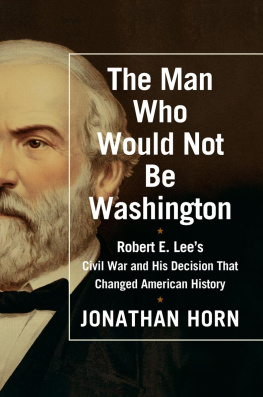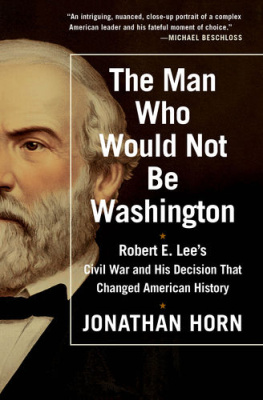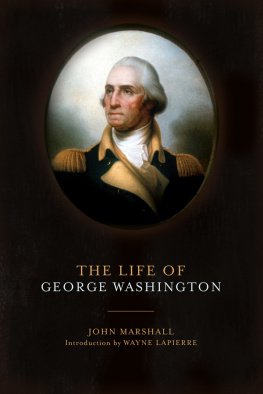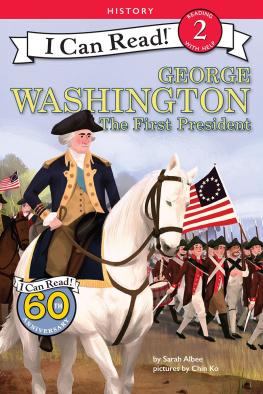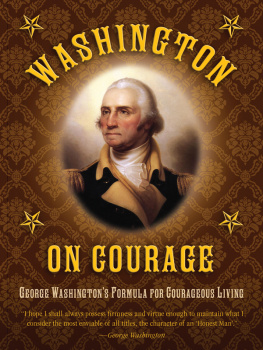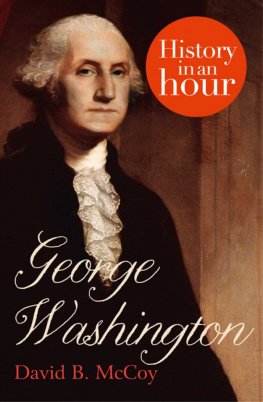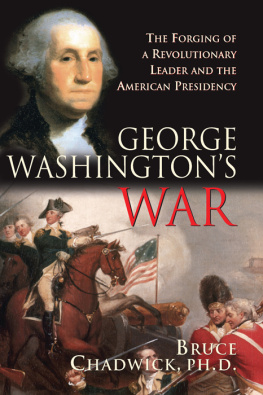Thank you for downloading this Scribner eBook.
Join our mailing list and get updates on new releases, deals, bonus content and other great books from Scribner and Simon & Schuster. CLICK HERE TO SIGN UP or visit us online to sign up at
eBookNews.SimonandSchuster.com

Contents
To Caroline, who went with me to the source of the Potomac and helped me find the way back home Who looks at Lee must think of Washington;In pain must think, and hide the thought,So deep with grievous meaning it is fraught. Herman Melville, Lee in the Capitol
Maps

PROLOGUE
The View
The cadets at West Point might not have nicknamed Robert E. Lee the Marble Model had they seen the statue of George Washington in the rotunda in Richmond. Here was a real marble model. On April 23, 1861, as the fifty-four-year-old Lee looked up at the figure, he could see how his fellow Virginian had appeared around the same age. By that time in his life, General Washington had won the Revolutionary War and made the historic decision to surrender power to civilian authority. Now the man who would not be king, as rendered by the sculptor Jean-Antoine Houdon, stood on a pedestal beneath the round skylight crowning Virginias capitol dome. Under his left hand lay thirteen rods, bound like the thirteen colonies themselves. A sword, no longer needed, dangled to the side. His body, stretching more than six feet from head to heel, faced away from the closed chamber his admirer waited to enter. If the men meeting behind those doors had their way, Lee would pick up the sword, cut the cords tying the rods, and secure Virginias independence anew.
The delegates to the state convention had requested Lees attendance at noon on this day. They had recently approved an ordinance removing Virginia from the Union. The vote transformed the Potomac River, whose banks generations of Washingtons and Lees had called home, into a fault line. Will the present line of separation be the permanent one? Lee now asked aloud. How often, when back home at dear Arlington House, he had admired the Potomac view: the current whisking past the Virginia hillside; the Washington Monuments unfinished shaft rising on the opposite bank; the columns atop the United States Capitol awaiting their dome in the distance.
Only five days earlier, Lee had crossed the Potomac for a meeting in the federal city. The new Lincoln administration had offered him command of the Union army being raised to crush the insurrection. Unable to imagine fighting against his native state but still unwilling to take sides against the Union George Washington had forged, Lee rejected the offer but did not yet surrender his commission in the army he had served for more than three decades. With his heart as divided as the riverbanks, he traveled back over the Long Bridge to Arlington House. Once behind the mansions massive columns, he entered a hall lit by the old Mount Vernon lantern and lined with paintings, including the earliest portrait of George Washington. Locked among these relics and otherssilver, china, and furniturethat had been a part of his life since marrying the daughter of the first presidents adopted son, Lee at last reached his decision. He could see no other path. He would resign from the US Army. Soon he was on to Richmond. En route, crowds swarmed his train at every stop. Lee, Lee, they chanted until he appeared on the rear platform with his hat tucked under his elbow. Strands of silver softened the dark hair sweeping over his wide forehead. A neat black mustache firmed up his lips. He stood just under six feet. Then, without uttering a word, he bowed and returned to his seat.
Now, once again, Lee heard his name. The double doors partitioning the chamber from the rotunda opened. An escort guided Lee into the old hall Thomas Jefferson had designed. The delegates stood as Lee entered. More than one noted his manly bearing. He walked almost halfway down the aisle and then stopped, as if torn between the Washington statue behind him and the convention president occupying the rostrum ahead. Everyone agreed Lee belonged somewhere along this linea link between the past and the future. In the eyes of the world, one relative said, the wedding thirty years earlier had transformed Lee into the representative of the family of the founder of American liberty. In requesting Lees service, President Abraham Lincolns emissary had appealed to Lees Washington connections. That the Virginia convention planned to do the same would have surprised no one. The delegates considered their choice of a commander in chief to be as momentous as the Continental Congresss.
Convention president John Janney, a white-haired conservative who had opposed secession before accepting its inevitability, had prepared a formal address suitable to the occasion. He welcomed the new commander in chief of Virginias armed forces as the heir to soldiers and sages of by-gone days, who have borne your name, and whose blood now flows in your veins. Two Lees had signed the Declaration of Independence. Another, Lees father, had served as one of Washingtons most trusted lieutenants during the Revolution. Washington himself was a blood relative, albeit a third cousin twice removed. Near Washingtons birthplace in Westmoreland County, Virginia, Lee had spent his first years toddling along the Potomac before moving upriver to Alexandria, the town closest to Washingtons Mount Vernon plantation. When the necessity became apparent of having a leader for our forces, said Janney, all hearts and all eyes, by the impulse of an instinct which is a surer guide than reason itself, turned to the old county of Westmoreland. It was not just the pedigree that persuaded the delegates but also the commensurate talent Lee had shown since his days at West Point. The armys ranking general had proclaimed Lee the very best soldier I ever saw in the field.
Lee, still standing in the aisle, must have thought about Arlington as Janney explained the conventions expectations. And now, Virginia having taken her position, as far as the power of this Convention extends, we stand animated by one impulse, governed by one desire and one determination, and that is that she shall be defended; and that no spot of her soil shall be polluted by the foot of an invader. The charge was simple, sweeping, and impossible. Lee already knew he could not protect the home he had left. The view he cherished overlooking the nations capital would render Arlington indefensible. Federal forces would cross the river, flood up the hillside, and seize the mansion. Unless his wife removed the relics soon, the Mt. Vernon plate & pictures, as Lee called them, would be lost. Arlington would never be the same.
Yet whatever reservations Lee harbored about the conventions judgment, the delegates harbored no doubts about Lee. Sir, Janney said toward the end:
we have, by this unanimous vote, expressed our convictions that you are, at this day, among the living citizens of Virginia, first in war. We pray to God most fervently that you may so conduct the operations committed to your charge, that it will soon be said of you, that you are first in peace, and when that time comes you will have earned the still prouder distinction of being first in the hearts of your countrymen.
No one, least of all Lee, could have missed Janneys allusion. Only one man had ever been first in war, first in peace, and first in the hearts of his countrymenGeorge Washington. It had been Lees father, Henry Light-Horse Harry Lee, who coined the phrase in a funeral oration for his old general. So popular had the epitaph become that the words fused the Washington and Lee names long after Harry Lee had drifted into disgrace. As a commentator in Robert E. Lees hometown newspaper put it, The fact that these memorable words, as they were addressed and applied by the distinguished President of the Convention, were the outpourings of his Fathers heart... must have been peculiarly touching and solemnizing to the newly appointed generalissimo. To be first in war, first in peace, and first in the hearts of his countrymen would make Robert E. Lee nothing short of George Washington.
Next page
